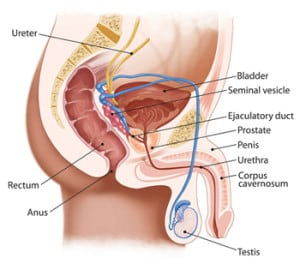The male reproductive system consists of 2 testicles (in the scrotum), penis, prostate gland, seminal vesicles and a tube to transport sperm – vas.
What is the Prostate Gland?
The prostate is a walnut sized gland situated below the bladder (Figure 1), in front of the rectum and behind the pubic bone. It is closely linked with the urinary system, because it encircles the water passage-urethra like a collar. It measures approximately 3-5 cm and weighs 15-20g in adults. It secretes much of the liquid portion of the seminal fluid that nourishes the sperm. Seminal vesicles (Figure 1) also contribute to the seminal fluid and are just behind and above the prostate gland.
In addition prostatic fluid also helps the sperm to swim easily towards the womb. Prostate starts enlarging after the age of 40 and symptoms vary from man to man. The prostate consists of fibromuscular tissue and glands with its own capsule.
The prostate is influenced by hormones testosterone (male hormone) and oestrogen (female hormone) and other hormones and growth factors.
How is the prostate gland examined?
Due to its location deep in the pelvis and its position near the rectum, it is examined by insertion of a finger through the back passage (digital rectal examination). The doctor is able to feel the surface of the gland through the wall of the rectum. It is important to note that only the part of prostate that is related to the rectum is felt and not the whole gland.
What are the disorders of the prostate gland?
There are 3 main conditions of prostate gland:
- Prostatitis – Inflammation or infection of the gland
- Benign prostatic hypertrophy – Noncancerous enlargement of prostate
- Prostate Cancer
What are the tests for prostatic conditions?
There are blood tests, urine tests and magnetic resonance imaging, which are specific for various conditions of prostate.
How do I keep my prostate healthy?
Eat healthy diet of fruits, vegetables and less animal fat, keep a watch on your weight, and if you’re worried, get advice from your doctor particularly if you have family history of prostate cancer.

Mr Vinod Nargund is a Consultant Urological Surgeon specialising in Urological cancer, male sexual and fertility problems. He was trained in Urology at the City Hospital Belfast, the Royal Infirmary Bradford and the Churchill and John Radcliffe Hospitals in Oxford. You can view all of his qualifications on his biography page.
